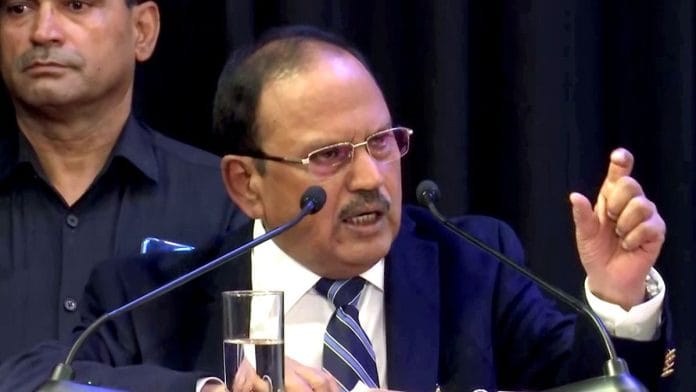New Delhi: Democracy and non-institutional methods of regime change in countries such as Bangladesh, Sri Lanka and Nepal have created their own set of problems, National Security Adviser (NSA) Ajit Doval said Friday.
Speaking at the 6th Sardar Patel Lecture on Governance, Doval said: “While democracy has had its successes, it has also created its own problems. It has led to partisan politics where there are dividends in division.”
The NSA went on to say that in today’s scenario, if a politician is able to win 25 votes out of a 100, the focus is not to increase their margin to “51” but rather fracture everyone’s votes to ensure they do not reach the number.
In such a situation it “is not an aspiration to make the votes 51, but to divide and fragment the society…We must guard against it,” said Doval.
The lecture was organised by the IC Centre of Governance and India International Centre and held on the 150th birth anniversary of Sardar Vallabhbhai Patel.
Focusing on history, Doval said the “rise and fall of great empires is actually a history of their governance”.
“In the end, it all boils down to the fact that the Roman Empire fell because it was mismanaged. The same applies to the French Revolution, Tsarist Russia, and the Mughal Empire—they all declined. In the post-war period, out of 37 countries that faced various degrees of degradation, 28 failed, were degraded, or got balkanised due to poor governance,” he added. “Change of regimes through non-institutional methods in Bangladesh, Sri Lanka, Nepal and others were actually cases of bad governance.”
In recent years, a number of countries in South Asia have all had protest movements leading to a change in government—Sri Lanka in 2022, Bangladesh in 2024 and Nepal most recently last month.
In Sri Lanka, it was the aftermath of a financial crisis, which led to then President Gotabaya Rajapaksa resigning and fleeing the country and being replaced by Ranil Wickremesinghe. Last year, Sri Lanka successfully held both Presidential and Parliamentary elections, as it continues to rebuild its economy.
Bangladesh is still controlled by an interim government led by Muhammad Yunus, following Sheikh Hasina’s departure from Dhaka on 5 August, 2024. India and Bangladesh ties have cooled in the last year, following the change in regime, with Yunus yet to travel to India almost 15 months after the change in government.
“There are some commonalities on why some states rise and some state falls. One has been authoritarianism. It has remained relevant of the past 3,000 years of recorded histories,” said Doval.
He added: “Institutional decay…internal security collapses or bureaucracies become inept and corrupt. The other factor is economic failures. Scarcity of food and water.”
He urged changes to make governance better across India, with a focus on creating policies and plans to meet the aspirations of the people, including a relook at the legal system.
(Edited by Gitanjali Das)






